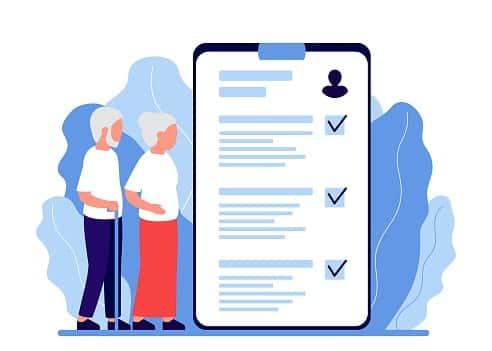
COBRA allows you to keep the health insurance plan from your previous employer when you leave your job. It's expensive because your employer will no longer pay a portion of the premium, but may be worth paying for to prevent a gap in health insurance coverage.
Last updated: Feb 9, 2024 Compare quotes in less than 5 minutes
Written by Leslie Kasperowicz
Executive EditorLeslie Kasperowicz is an insurance expert with four years of direct agency experience and over a decade of creating educational content to help insurance shoppers make confident, informed decisions.

Reviewed by John McCormick
John is the editorial director for CarInsurance.com, Insurance.com and Insure.com. Before joining QuinStreet, John was a deputy editor at The Wall Street Journal and had been an editor and reporter at a number of other media outlets where he covered insurance, personal finance, and technology.
Fact checkedAt Insurance.com, we are committed to providing the timely, accurate and expert information consumers need to make smart insurance decisions. All our content is written and reviewed by industry professionals and insurance experts. Our team carefully vets our rate data to ensure we only provide reliable and up-to-date insurance pricing. We follow the highest editorial standards. Our content is based solely on objective research and data gathering. We maintain strict editorial independence to ensure unbiased coverage of the insurance industry.
COBRA is a law that allows you to keep your former employer's health insurance coverage when leaving a job. If your health insurance ends with your employment, COBRA allows you to stay on your previous employer’s plan for up to 18 months.
COBRA health insurance costs can come as a shock if you're accustomed to your employer paying a large part of the premiums. You’ll have to pay the entire premium plus up to 2% in administrative fees. Many people don't understand how COBRA works or why it's so expensive. COBRA isn't a type of health insurance; it just allows you to keep existing coverage.
How do you get COBRA health insurance? Can you get COBRA if you quit? Read on to learn more about how COBRA works, how much it costs and when it might be the right choice.
COBRA stands for the Consolidated Omnibus Reconciliation Act, created as a health insurance safety net.
COBRA lets you extend your former employer's health plan. You benefit from the same coverage, though your former employer stops contributing money, which means you pay the entire premium.
Before the Affordable Care Act (ACA), people with pre-existing conditions had difficulty getting health insurance on the private market. Although the ACA removed pre-existing condition clauses, COBRA remains an option for keeping health insurance during the transition.
You can elect COBRA for you and your family when:
If you become eligible for COBRA, your employer will notify the insurance company within 30 days of your last day.
The health insurance company will send you information about how to sign up for COBRA and how much it will cost. You have 60 days to sign up.
With COBRA, you can use your health insurance plan like you did when employed. However, you’ll pay all the costs without help from your former employer.
You can keep COBRA for at least 18 months. Sometimes, you can have a COBRA plan for up to 36 months, depending on the qualifying event.
Yes, you can get COBRA if you quit. Regardless of the reasons for leaving your job, you can elect COBRA within 60 days of your last day.
Nothing about your coverage, eligibility, or the time you can keep COBRA changes if you quit vs. a layoff or being fired.
COBRA requires you to pay 100% of the health insurance premium plus up to a 2% administrative fee. Your former employer will no longer pay any part of the cost.
The cost of COBRA depends on the health insurance plan. According to the Kaiser Family Foundation, the average cost of an employer-sponsored family plan in 2021 was $22,221. The employer paid a portion of that cost when you were employed, but with COBRA you will pay the entire amount.
COBRA is pricey, but there are some options for help. First, you can use Health Savings Account (HSA) funds to pay your COBRA premiums if you have one.
The U.S. Department of Labor offers a Health Coverage Tax Credit (HCTC) for people who lose their jobs because of the “negative effects of global trade.” The HCTC pays 72.5% of premiums if you’re eligible.
COBRA insurance premiums are high because when you leave a job, you're no longer part of an employer-sponsored health plan, which means you have to pay the full cost of the coverage. Usually, employers pay a significant portion of an employee's healthcare premiums.
Enrolling in COBRA is relatively simple. You will have 60 days to notify your health plan administrator that you want to enroll. They will send you a notice of COBRA eligibility, and from there, you will select the option to enroll for yourself and any eligible family members who want to enroll.
The notice will also provide detailed information on the premiums you will need to pay and your payment options. You will need to make a payment within 45 days of submitting the application form for your benefits to apply.
You can start COBRA coverage at any time during the 60 days, even if you waived coverage at first, but premiums will be retroactive. You can also cancel COBRA coverage at any time.
COBRA coverage ends automatically when you:
COBRA coverage also ends if the employer:
If the employer changes health plans, you can switch to the new one like everybody else, but you can't keep the old one. If you have a family health plan, not all family members must enroll in COBRA.
Mini-COBRA permits employees of companies with 20 or fewer employees to continue health insurance coverage. It allows you to pay group rates for a specified time period. Most states have mini-COBRA laws for people who are employed by small businesses.
These state laws work like the federal COBRA law, but the length of eligibility may differ:
Not all states allow mini-COBRA plans, and others have limited eligibility. State laws vary significantly, so check with your state’s Department of Insurance for specifics about mini-COBRA laws.
Alternatives to COBRA include a catastrophic health plan, short-term health insurance, or an ACA-compliant health plan. Any of these may be more affordable.
If you decide on a COBRA alternative, check the provider networks and what's covered. Find out more about your options by using our Health Insurance Finder tool.
COBRA is expensive, but it could be worth it if you can’t find a better alternative. If you have a lot of medical needs and can’t be without coverage, COBRA is an easy way to continue with the same network and providers.
You may also want a COBRA plan if you expect new coverage to begin soon, such as with a new employer, but there is an anticipated gap before your new coverage kicks in.

People who lose their employer-sponsored health insurance may qualify for a COBRA plan. COBRA lets you keep your former employer's health plan, but you're responsible for paying all of the costs, including your former employer's portion.
Know more about COBRA

Our recommendation
Back Reset resultPeople who are 65 and over qualify for Medicare. You can choose Original Medicare (also called Parts A and B), which is offered by the federal government, or Medicare Advantage (also called Part C), which private insurers provide. The average annual premium for Original Medicare is about $1,600. Medicare Advantage's average yearly premium is $336, but you may have higher out-of-pocket costs than Original Medicare.
Find out more about Medicare costs

Our recommendation
Compare and Buy Health Insurance Quotes in minutes Compare quotes Back Reset result Our recommendationLow-income Americans qualify for Medicaid. Thirty-eight states expanded Medicaid eligibility, so lower-middle-class Americans may also be eligible in those states. Medicaid offers comprehensive benefits, but at little to no cost depending on your income. Each state has its own eligibility. Some states are flexible with Medicaid eligibility for people who are pregnant, a parent or disabled. If your household income is below 138% of the federal poverty level, you're likely eligible for Medicaid if you live in a Medicaid expansion state. That level is $17,609 for an individual, $23,791 for a family of two, $29,974 for a family of three and $36,156 for a family of four. Non-Medicare expansion states have stricter income guidelines. Check with your state's Medicaid program to see if you qualify.
You can also opt for Individual insurance/Affordable Care Act plan Back Reset result
Our recommendation
Compare and Buy Health Insurance Quotes in minutes Compare quotes Back Reset result Our recommendationThe Affordable Care Act lets children stay on a parent's health plan until the age of 26. Having a child on a parent's health plan may or may not increase premiums. It depends on whether you already have family coverage when adding the child to the plan. If a parent already has family coverage, adding a child won't likely increase premiums. However, going from single or couple to family coverage could cause premiums to skyrocket. The average single coverage employer-sponsored plan premium is $1,186. The average family plan is $5,447.
You can also opt for Individual insurance/Affordable Care Act plan Back Reset result
Our recommendation
Back Reset result Our recommendationMost employers allow employees to add spouses to their health insurance. Going from single health coverage to a family plan may triple or quadruple your premiums. The average single coverage employer-sponsored plan premium is $1,186. The average family plan is $5,447. Not all jobs allow for spouse's coverage, so you'll want to check with your employer to make sure it's an option.
You can also opt for Individual insurance/Affordable Care Act plan Back Reset result
Our recommendation
Find out more about Back Reset result Our recommendationMost people with private health insurance get their coverage through a job. employer-sponsored health insurance is usually cheaper than individual health insurance unless you qualify for Affordable Care Act subsidies. Job-based plans are generally less expensive because businesses often pick up more than half of employer-sponsored health insurance premiums. Kaiser Family Foundation estimates the average premiums for a single coverage employer-sponsored health plan is $1,186 and the average family plan is $5,447 annually.
You can also opt for Individual insurance/Affordable Care Act plan Back Reset result
Our recommendation
Click to each one of find out more Back Reset result Employer plans are often one of these types of four plans. Click on each one to find out more.The Affordable Care Act created insurance exchanges that allow people to compare plans. The health law also requires insurers to accept everyone and not charge them exorbitant rates. People who make below 400% of the federal poverty level qualify for subsidies to help pay for an ACA plan.
Know more individual insurance / ACA

The Affordable Care Act created insurance exchanges that allow people to compare plans. The health law also requires insurers to accept everyone and not charge them exorbitant rates. People who make below 400% of the federal poverty level qualify for subsidies to help pay for an ACA plan.
Know more individual insurance / ACA
Silver is the second most popular plan in the ACA exchanges, with 35% of people with a Silver plan. Silver has lower premiums than any plan except for Bronze. However, it has lower out-of-pocket costs than Bronze. Silver plans pick up 70% of the costs, while members pay 30% The average single coverage in a Silver plan is $481 monthly and $1,179 for a family plan.
Bronze is the most popular type of plan in the ACA exchanges, with 41% of members with a Bronze plan. These plans have the lowest premiums, but also the highest out-of-pocket costs in the exchanges. Bronze plans pick up 60% of the costs, while members pay 40%. The average single coverage monthly cost in a Bronze plan is $440 and $1,080 for a family plan.
Compare and Buy Health Insurance Quotes in minutes Compare quotes Back Reset result Individual insurance/Affordable Care ActThe Affordable Care Act created insurance exchanges that allow people to compare plans. The health law also requires insurers to accept everyone and not charge them exorbitant rates. People who make below 400% of the federal poverty level qualify for subsidies to help pay for an ACA plan.
Know more individual insurance / ACA
Platinum plans have the highest premiums but the lowest out-of-pocket costs. So, you pay more for the coverage initially but less than other plans when you need health care services. Platinum plans pick up 90% of the costs, while members pay 10%, Not many health insurers offer Platinum plans. Only 2% of members in ACA plans have a Platinum plan, so you may have trouble finding one. The average monthly premiums for single coverage in a Platinum plan is $706 and the average family coverage costs $1,460.
Gold plans have lower premiums than Platinum, but higher premiums than Silver and Bronze. Gold also has lower out-of-pocket costs than Silver and Bronze, but higher than Platinum. Gold plans pick up 80% of the costs, while members pay 20%. The average monthly premium for a single Gold plan is $596. Family coverage averages $1,426 per month.
Compare and Buy Health Insurance Quotes in minutes Compare quotesYes, COBRA includes your dental and vision insurance for the same period of 18 months.
If your dental and vision is separate from your medical insurance, you can keep one or the other through COBRA. If the dental or vision is bundled with your medical insurance, it will continue.
Yes, you can change from COBRA to a marketplace plan during the open enrollment period if:
Yes, you can extend your COBRA continuation coverage in two specific circumstances. The first is when a qualified beneficiary becomes disabled and meets specific requirements. They are entitled to an 11-month extension on their maximum period of continuation coverage.
The second is if you experience another life event that qualifies you for an extension, such as:




950 Tower Ln, Suite 1200, Foster City, CA 94404
Insurance.com is not affiliated with any state or government agency.
Copyright © 2024 Insurance.com. All Rights Reserved.
Disclaimer: The advertisers appearing on this website are clients from which QuinStreet receives compensation (“Sponsors”). Compensation may impact where the Sponsors appear on this website (including the order in which they appear). Our websites do not, and are not intended to, provide a comprehensive list of all companies that may provide the products and services you are seeking.
950 Tower Ln, Suite 1200, Foster City, CA 94404
Insurance.com is required to comply with all applicable federal law, including the standards established under 45 CFR 155.220(c) and (d) and standards established under 45 CFR 155.260 to protect the privacy and security of personally identifiable information. This website may not display all data on Qualified Health Plans (QHPs) being offered in your state through the Health Insurance Marketplace SM website. To see all available data on QHP options in your state, go to the Health Insurance Marketplace SM website at HealthCare.gov. No individual applying for health coverage through the individual marketplace will be discouraged from applying for benefits, turned down for coverage or charged more premium because of health status, medical condition, mental illness claims experience, medical history, genetic information or health disability. In addition, no individual will be denied coverage based on race, color, religion, national origin, sex, sexual orientation, marital status, personal appearance, political affiliation or source of income.